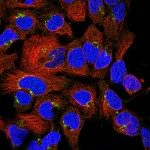Lien vers Pubmed [PMID] – 22389312
J. Leukoc. Biol. 2012 May;91(5):817-28
Many prion diseases are acquired by peripheral exposure, and skin lesions are an effective route of transmission. Following exposure, early prion replication, upon FDCs in the draining LN is obligatory for the spread of disease to the brain. However, the mechanism by which prions are conveyed to the draining LN is uncertain. Here, transgenic mice were used, in which langerin(+) cells, including epidermal LCs and langerin(+) classical DCs, were specifically depleted. These were used in parallel with transgenic mice, in which nonepidermal CD11c(+) cells were specifically depleted. Our data show that prion pathogenesis, following exposure via skin scarification, occurred independently of LC and other langerin(+) cells. However, the depletion of nonepidermal CD11c(+) cells impaired the early accumulation of prions in the draining LN, implying a role for these cells in the propagation of prions from the skin. Therefore, together, these data suggest that the propagation of prions from the skin to the draining LN occurs via dermal classical DCs, independently of langerin(+) cells.

